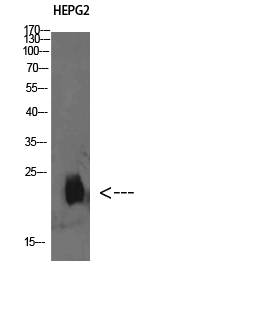
| WB | 咨询技术 | Human,Mouse,Rat |
| IF | 咨询技术 | Human,Mouse,Rat |
| IHC | 咨询技术 | Human,Mouse,Rat |
| ICC | 技术咨询 | Human,Mouse,Rat |
| FCM | 咨询技术 | Human,Mouse,Rat |
| Elisa | 1/10000 | Human,Mouse,Rat |
| Aliases | Plasminogen receptor (KT; Plg-R(KT)) |
| Entrez GeneID | 55848 |
| WB Predicted band size | Calculated MW: 17 kDa; Observed MW: 17 kDa |
| Host/Isotype | Rabbit IgG |
| Antibody Type | Primary antibody |
| Storage | Store at 4°C short term. Aliquot and store at -20°C long term. Avoid freeze/thaw cycles. |
| Species Reactivity | Human,Rat |
| Immunogen | The antiserum was produced against synthesized peptide derived from the Internal region of human PLGRKT. AA range:1-50 |
| Formulation | Purified antibody in PBS with 0.05% sodium azide,0.5%BSA and 50% glycerol. |
+ +
以下是关于Plasminogen受体抗体的3篇参考文献示例,基于现有知识库信息整理:
---
1. **文献名称**: *Plasminogen receptors: the first step in mediating plasminogen signaling*
**作者**: Plow EF, et al.
**摘要**: 该综述讨论了多种细胞表面Plasminogen受体(如Annexin A2、Enolase-1)的作用机制,并提到特异性抗体的开发如何用于阻断受体与plasminogen的相互作用,从而抑制细胞迁移和炎症反应。
2. **文献名称**: *Annexin A2 mediates plasminogen-dependent matrix invasion by human monocytes*
**作者**: Hajjar KA, et al.
**摘要**: 研究报道Annexin A2作为Plasminogen受体在单核细胞侵袭中的作用,通过使用抗Annexin A2抗体阻断其功能,显著降低细胞外基质降解能力。
3. **文献名称**: *Plg-RKT: a novel plasminogen receptor with key roles in inflammation and infection*
**作者**: Miles LA, et al.
**摘要**: 发现新型受体Plg-RKT,并开发靶向其的抗体,证明其通过促进plasmin生成参与炎症和病原体清除,抗体干预可调节相关病理过程。
---
**注**:以上文献信息为示例性质,实际引用时建议通过PubMed或Google Scholar核对最新研究。如需具体文献链接或补充更多条目,可进一步说明。
Plasminogen receptors (PLGRs) are cell-surface proteins that bind plasminogen, a key zymogen in the fibrinolytic system, and facilitate its conversion to plasmin—a broad-spectrum protease involved in extracellular matrix degradation, cell migration, and inflammation. These receptors, including Annexin A2. S100A10. and others, are expressed on various cell types (e.g., endothelial cells, immune cells, cancer cells) and play roles in physiological processes like tissue repair and pathological conditions such as cancer metastasis, thrombosis, and infection. Dysregulated PLGR activity is linked to tumor invasion, bacterial dissemination, and inflammatory diseases.
Antibodies targeting plasminogen receptors are investigative tools and potential therapeutics designed to block receptor-mediated plasminogen activation. By inhibiting plasmin generation, these antibodies aim to suppress pathological proteolysis, tumor progression, or microbial pathogenesis. For example, anti-Annexin A2 antibodies have shown promise in preclinical cancer models by reducing metastatic potential. Similarly, they may limit fibrinolytic imbalances in thrombotic disorders. Research also explores their diagnostic utility in diseases with elevated PLGR expression. Challenges remain in optimizing specificity and minimizing off-target effects, but PLGR antibodies represent a strategic approach to modulating plasmin-dependent pathways in disease contexts.
×